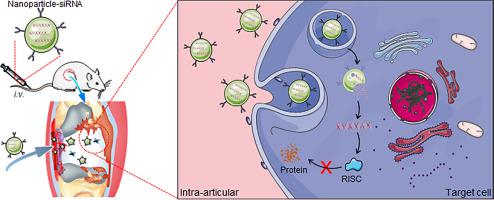Journal of Controlled Release ( IF 10.5 ) Pub Date : 2020-07-10 , DOI: 10.1016/j.jconrel.2020.07.006 Naibo Feng 1 , Fengjin Guo 1

|
Rheumatoid arthritis (RA) is a common clinical inflammatory disease of the autoimmune system manifested by persistent synovitis, cartilage damage and even deformities. Despite significant progress in the clinical treatment of RA, long-term administration of anti-rheumatic drugs can cause a series of problems, including infections, gastrointestinal reactions, and abnormal liver and kidney functions. The emergence of RNA interference (RNAi) drugs has brought new hope for the treatment of RA. Designing a reasonable vector for RNAi drugs will greatly expand the application prospects of RNAi. Nanoparticles as a promising drug carrier provide reliable support for RNAi drugs. The review summarizes the pathogenesis of RA as a possible target for small interference RNA (siRNA) design. At the same time, the review also analyzes the nanoparticles used in siRNA carriers in recent years, laying the foundation and prospect for the next step in the development of intelligent nanocarriers.
中文翻译:

纳米siRNA:类风湿关节炎治疗的潜在策略?
类风湿关节炎(RA)是一种自身免疫系统常见的临床炎症性疾病,表现为持续性滑膜炎,软骨损伤甚至畸形。尽管RA的临床治疗取得了重大进展,但长期服用抗风湿药仍会引起一系列问题,包括感染,胃肠道反应以及肝肾功能异常。RNA干扰(RNAi)药物的出现为RA的治疗带来了新希望。为RNAi药物设计合理的载体将大大拓展RNAi的应用前景。纳米颗粒作为有前途的药物载体为RNAi药物提供了可靠的支持。该综述总结了RA的发病机理,将其作为小分子干扰RNA(siRNA)设计的可能靶标。同时,





















































 京公网安备 11010802027423号
京公网安备 11010802027423号